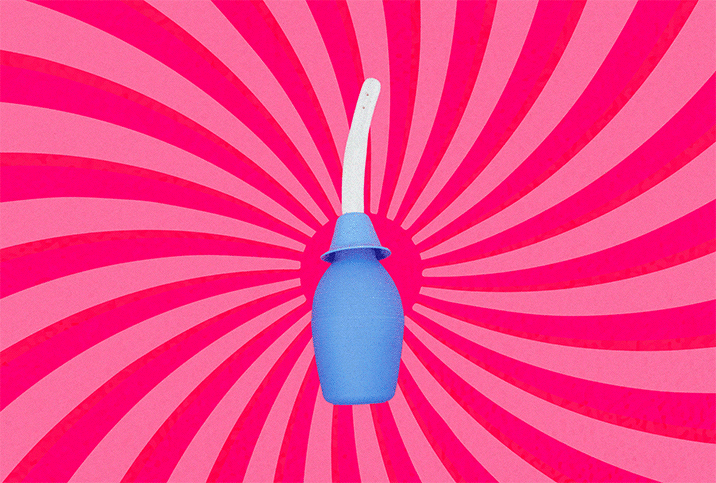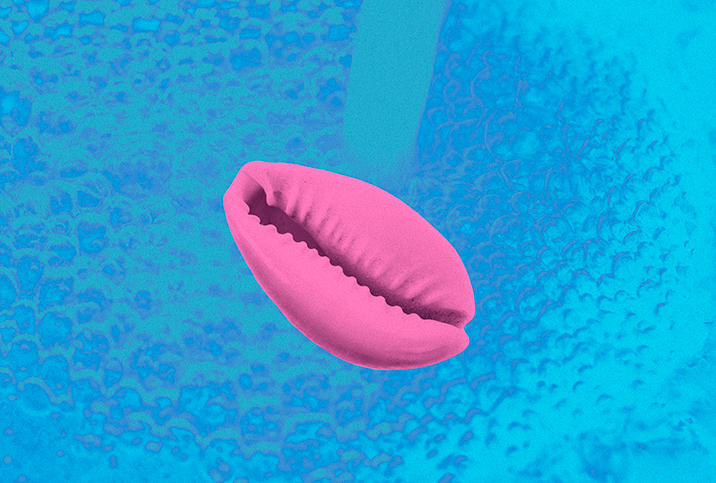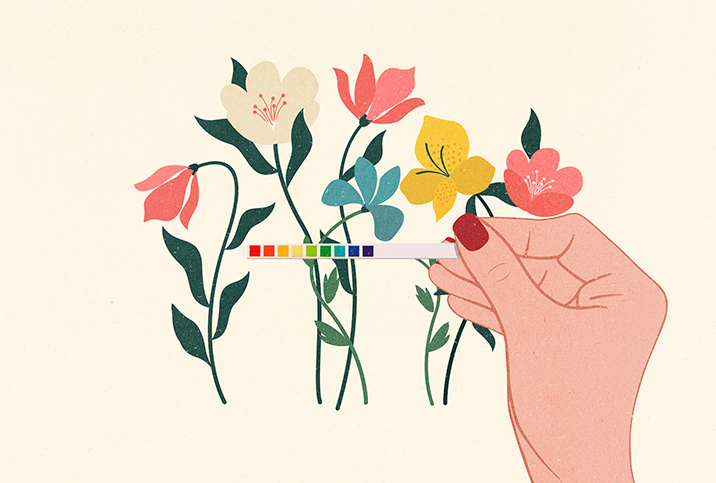Vaginal Douching Defined and Why Doctors Say You Should Avoid It

Medical studies define vaginal douching as "the process of intravaginal cleansing with a liquid solution. Douching is used for personal hygiene or aesthetic reasons, for preventing or treating an infection, to cleanse after menstruation or sex, and to prevent pregnancy." This is also the preferred definition used by Shazia Malik, M.D., an experienced consultant obstetrician and gynecologist in London.
But what does that really mean? Gretchen Frey, M.D., a board-certified OB-GYN in Colorado, explained it simply: "Vaginal douching is the process of rinsing out the vagina."
The douching process starts with putting some cleansing solution into a flexible bag, which you attach to a soft tube with a perforated end. While seated on a toilet or bidet, insert the end of the tube into the vagina and hold the bag above the level of the tube. Gravity forces the solution out of the tube through the perforations and into the upper part of the vagina. The solution then drains into the toilet, Frey described.
Vaginal douching is easy to do, but is it necessary? You might wonder if it's just another fad or if it's something you should start doing. We consulted some experts to find the answers.
How common is douching?
"Unfortunately, it appears to be more common than we realize," Malik said.
Monte Swarup, M.D., a board-certified OB-GYN in Arizona and the founder of Vaginal Health Hub, said research shows between 20 percent and 40 percent of women ages 15 to 44 use vaginal douches, with rates higher among teenagers.
"The practice of douching has waxed and waned in popularity over the years," Frey said.
Generally, women choose to douche:
- After a menstrual period
- If they perceive an unpleasant odor or discharge
- If they have been taught douching is necessary for cleanliness
- After intercourse
Swarup added that many women think douching helps to prevent sexually transmitted infections (STIs) and pregnancy after intercourse.
"They do not work for this," he stated.
Another reason women may decide to douche is the influence of social media.
"There's lots of misinformation, which can mislead women into thinking that douching can somehow protect them from infections or pregnancy," Malik said. "There can also be a perceived pressure to look or smell a particular way, rather than accepting a normal and natural odor from vaginal secretions."
She advised that vaginal discharge can change often. During pregnancy or while taking hormonal contraception, discharge increases. It may also increase or change consistency midcycle, which can help with fertilization.
"I often have to explain to women that it is quite normal to have vaginal discharge and some women have more than others. And that's fine, as long as there are no warning signs that something is wrong," Malik said.
To douche or not to douche?
If you're wondering whether you should douche, the simple answer is no. Obstetricians and gynecologists do not recommend douching. A woman should let her vagina clean itself, which it does naturally, Swarup said.
"Its lining is sensitive, like that of the mouth. We generally avoid washing our mouths out with soap or harsh chemicals," Frey said.
Douching can remove natural, protective vaginal secretions, including the beneficial bacteria that make up the vaginal microbiome, Frey said. It can upset the natural acidic pH or dry and irritate the vaginal lining.
"This cannot only lead to further discomfort and discharge but can actually increase the chance of vaginal infection, whether with common organisms like yeast or with a sexually transmitted infection," Frey stated.
Instead of washing your vagina, focus on cleansing the vulva, which includes your inner and outer labia.
"Washing the vulva with warm water alone or, at most, a tiny amount of very mild soap and lots of warm water is all that needs to be done," Frey said.
How should women clean their vaginas?
The vagina doesn't need cleaning. However, it's a good idea to keep your vulva and perineum clean, Malik said. The perineum is the area between the anus and genitals.
"I recommend that my patients wash with warm water around the vulva once or twice a day. No soaps or scented products or intimate washes, though," she advised.
When you poop, use a wipe or wash with soap around the anus, Malik said. You'll wash away gut bacteria that can cause infections from around the anus, which isn't too far from your vaginal opening.
Women who are determined to douche should do so as seldom as possible (less than once a month) and avoid prepackaged products, which often contain iodine, alcohol or other irritating substances, Frey said.
"A simple formula of 1 tablespoon of white vinegar in 1 quart of warm water will come the closest to preserving the vaginal pH and be reasonably gentle on the vaginal lining. Preparing a douche in this way is also inexpensive and avoids the question of 'Do douches expire?' since it is not a commercial preparation," Frey said.
If you're wondering if prepackaged douches expire, the answer is yes. Look for an expiration date on the packaged product.
When should you see a doctor for vaginal odor?
"Douching should not be done for excessive vaginal discharge or a perceived unpleasant odor. These are reasons to see your doctor. There may be an infection or a bacterial imbalance that needs medical treatment," Frey stated.
Malik advised that you should see a doctor if:
- Your normal vaginal discharge has an offensive odor
- Your vaginal discharge becomes green and/or frothy
- Sex has become painful
- Your vulva is red and/or sore
- You're bleeding between periods or after sex
- You have a fever, especially if you have pelvic pain and/or discharge
See your healthcare provider immediately if you notice any of these symptoms. You may have an infection or need further testing or treatment, all of which your doctor can provide.


















